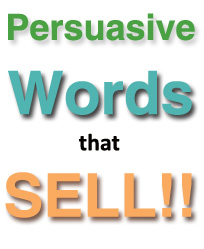 |
| Most Persuasive Words |
What's the Most Persuasive Word in the
English language?
Which one word can help you connect
quicker with people and strengthen your
persuasion efforts?
Do you know how this one word can
have major influences on your persuasion
attempts?
The Most Persuasive Word in English: 'Because'
Telling people the reason why you are doing
something has a major influence on how they
react to you because, more often than not,
people willingly comply with requests when
given reasons why they should. Ellen Langer,
a social psychologist at Harvard University,
demonstrated that people respond automatically
and without thinking when given the proper stimulus.
The Power of 'Because'
Here’s how the experiment went: In a busy library,
one of her subjects would approach the person at
the front of the line for the photocopier and say,
“Excuse me, I have five pages. May I use the Xerox
machine because I am in a rush?” This request was
successful 94 percent of the time.
Later, when the subject returned to ask another
group of people lined up at the same machine and said,
“Excuse me, I have five pages. May I use the Xerox machine?”
her success rate dropped to 60 percent. No big surprise here.
What was a big surprise was that when the subject
approached the front of the line a little later and asked,
“Excuse me, I have five pages.
May I use the Xerox machine because I have to make these copies?”
the compliance rate whizzed back up to 93 percent!
Public Speaking Tip: Use the Word 'Because'
When you want to connect quickly, offer your contact a “because” and chances are you’ll be successful. For example, if you’re aiming to do business with company Q, and you meet a key contact there, instead of simply saying, “I’m delighted to meet you,” add “because I’ve read so much about your pioneering work with XYZ . . .”
P.S. Gain access to the most important public speaking
tips by entering your email address in the box at the top
of the page
of the page
About the Author
The above article is by Nicholas Boothman.
You can read more of his articles on:
http://www.nicholasboothman.com










